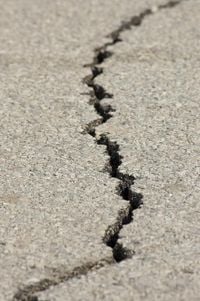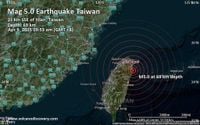A magnitude 5.8 earthquake struck Taiwan on Wednesday morning, April 9, 2025, triggering alarms in the capital, Taipei. The Central Weather Administration measured the earthquake at 5.8 magnitude, while the U.S. Geological Survey (USGS) reported a slightly lower magnitude of 5.0. The tremor in Taipei lasted only a few seconds, but its impact was felt widely.
The epicenter of the earthquake was located approximately 21 kilometers (12 miles) south-southeast of Yilan on the northeast coast, centered about 69 kilometers (43 miles) beneath the Earth's surface. Such deeper earthquakes can often be felt over a larger area, although they typically cause less damage than shallower quakes.
Despite the tremor's strength, firefighters in Yilan County reported no immediate knowledge of damage or injuries. Rail links, including high-speed lines, remained unaffected, although the Taipei metro temporarily reduced its speed during the incident. This quick response reflects the island's preparedness for seismic activity, a necessity given its location along the "Ring of Fire," a region known for its seismic activity.
Taiwan has a history of significant earthquakes, with the worst modern quake occurring in 1999. That devastating event, which registered a magnitude of 7.7, resulted in the deaths of 2,415 people and prompted changes in building codes and emergency response protocols. Following that earthquake, public education campaigns on earthquake safety became a priority, and regular drills are held in schools and workplaces to prepare residents for future seismic events.
The last major earthquake in Taiwan occurred in April 2024, registering a magnitude of 7.4, the strongest in 25 years. That quake tragically killed at least 17 people and caused landslides, severely damaging buildings around Hualien, located on the eastern side of the island. The memory of such disasters weighs heavily on the minds of residents, making the recent tremor a reminder of the ever-present risks.
Earthquakes are a common occurrence in Taiwan, largely due to its position at the convergence of two tectonic plates. The Pacific Plate and the Philippine Sea Plate meet near the island, creating a highly active seismic environment. This geological setting means that residents must remain vigilant, prepared for the possibility of aftershocks or more significant quakes.
In the wake of Wednesday's earthquake, officials and emergency services are closely monitoring the situation. The Central Weather Administration continues to provide updates, and residents are encouraged to stay informed through official channels. While the immediate reports indicate no damage, the potential for aftershocks remains a concern.
As Taiwan continues to recover from the impact of past earthquakes, the government has invested in improving infrastructure and emergency response systems. The lessons learned from previous disasters have shaped current policies, ensuring that the population is better equipped to handle future seismic events.
In conclusion, while the 5.8 earthquake on April 9 was alarming, the preparedness of Taiwan’s residents and emergency services helped mitigate potential damage and injuries. As the island remains vigilant, the focus continues to be on enhancing safety measures and ensuring that the population is equipped to respond effectively to any seismic threat.






